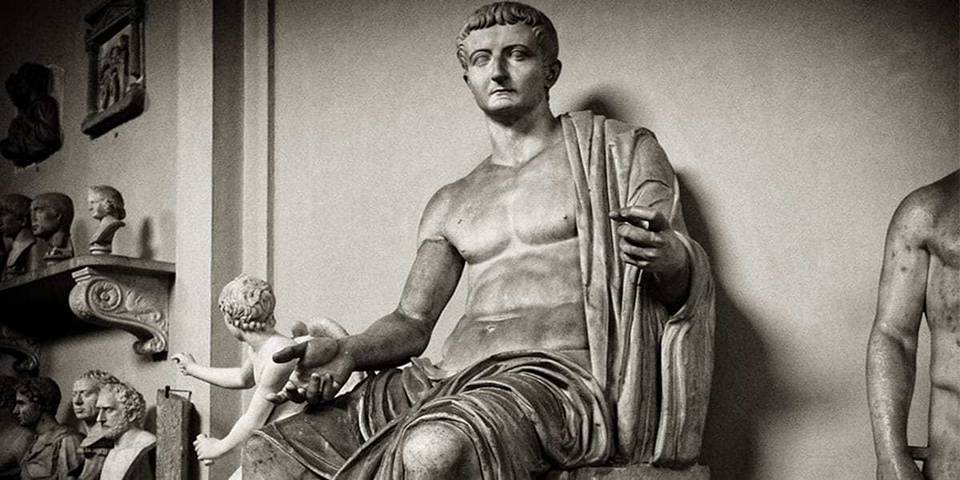

25148 views

Tiberius Julius Caesar was the second Roman Emperor of the ancient Roman Empire, who ruled from 14 to 37 CE. The emperor was adopted by Augustus Caesar (adopted son of Julius Caesar), the first emperor. However, he didn’t follow his father’s ideas and projects but rather listened to his mother, Livia Drusilla.
Tiberius was born in 42 BCE, and his real father was Tiberius Claudius Nero, who didn’t support Augustus’ views. The parents of the emperor divorced when he was only 4 years old, and the mother, Livia, chose another man whom she found better than Nero. This man was the enemy of her ex-husband – Augustus, who married her in 39 BCE.
Contents
ToggleDuring the reign of Tiberius, which lasted for 23 years, he lived a life full of suspicions. Moreover, he made the island of Capri the place for the sentence to death of all people whom he suspected. Also, historians claim that he was a depraved sexual predator with exceptional fantasy. However, Tiberius was a talented military commander and highly respected leader of the Senate, but he almost didn’t have friends.
Augustus didn’t want Tiberius to become an emperor, but because of his death and the death of his grandsons Gaius and Lucius, Tiberius came in line for the imperial throne
To become a candidate for the imperial throne, Tiberius was forced to divorce his beloved and pregnant wife, Vispania Agrippa (daughter of Marcus Agrippa). This decision was based on the orders of Augustus, who wanted Tiberius to marry Julia. In 12 BCE, they married, but Julias’ reputation pushed Augustus to exile her from Rome, and she died in 14 CE because of starvation. Importantly, Tiberius never showed great enthusiasm for coming to power. Moreover, he was adopted by Augustus when he was in his forties, which was an uncommon practice in Rome.
Tiberius’ mother always thought that she led him to power, and Livia wasn’t satisfied to have leadership in equal rules with him. Many historians claim that Livia somehow influenced the death of Augustus, after which she was removed from public affairs. At the same time, Tiberius refused to have any contact with her until her death in 29 CE, when she was already 86 years old.
It was obvious that Tiberius didn’t want to become emperor because he always tried to get rid of the political arena. Undoubtedly, his military skills and talent of being a general were amazing, but in 6 BCE, Tiberius went into self-imposed exile on Rhodes Island without returning to Rome up until 2 CE. He had to receive official permission from Augustus to come back to Rome, and after the death of the first Emperor, Tiberius acquired an allowance to become a new emperor. Despite the fact that his first years of leadership went well, he allowed the Senate to make many decisions instead of deciding by himself.
Tiberius began many public projects that were finished by Roman emperor Caligula later on.
Germanicus Julius Caesar Claudianus was the adopted son of Tiberius, who he adopted at the request of Augustus. Moreover, Germanicus was chosen by many of the generals and supported Tiberius by making his opponents silent. However, Germanicus died suddenly after his illness in 18CE. His widow, Agrippina the Elder, came back to Rome assuming that it was Tiberius who ordered the death of her son.
Agrippina wanted her sons: Nero Caesar, Drusus Caesar, and Gaius Julius Caesar (Caligula) to be considered next in line to the throne
However, among them, only Caligula survived and became the new emperor of the Roman Empire. Drusus was starved to death, while Nero was assassinated. Agrippina also was exiled and dead soon, so Caligula and his sisters started to live with Tiberius on Capri. The death of Germanicus made Tiberius more cruel, and historians describe him as a person who loved seeing people suffer.
Tiberius moved to Capri in 26 CE, leaving most of the responsibility to the Praetorian Guard, Lucius Aelius Sejanus. The emperor trusted his main advisor, and Sejanus started to believe that he had all chances to become the next emperor, but he made a fatal mistake. The son of Tiberius by Vispania (Julius Caesar Drusus) was married to Livillia, named after Livia, and Sejanus started having an affair with her, considering Drusus his main rival. Later, Drusus died of poisoning in 23 CE.
In addition, Sejanus divorced his wife and left his children, but Tiberius denied the request of Livillia and Sejanus to marry in 25 CE. At that period of time, Sejanus already had forces consisting of 12.000 people and started to work on treason trials to weed out any possible opposition. The period was difficult for citizens since they lived in fear.
Video about Tiberius on YouTube
In 31 CE, the couple announced their marriage without an official permission from the emperor
The mother of Livilla wrote to the emperor to inform him that Livilla and Sejanus had a plan to kill Tiberius and Caligula. Tiberius immediately returned to Rome and, together with the Senate, forced Sejanus to answer the accusations. Consequently, Sejanus was found guilty and strangled in public.
Moreover, his death was definitely cruel since his body was torn limb from limb, and his remains were left to the dogs. Moreover, his sons and followers were executed, while Livillia was starved to death under the control of her own mother.
All these occasions led Tiberius to the paranoiac way of life and imposed him to increase the number of treason trials. In 37 CE, he died on Capri at the age of 77.
Read also about: Emperor Claudius.
Author: Kate Zusmann
This website uses cookies. For more info read the cookies policy
Rome.us © 2026. Created with love by Roman experts and guides.